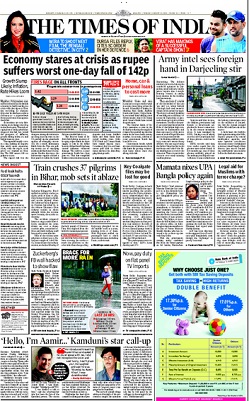The Times of India

20 August 2013 front page of the Kolkata edition of The Times of India
|
|
| Type | Daily newspaper |
|---|---|
| Format | Broadsheet |
| Owner(s) | The Times Group |
| Publisher | The Times Group |
| Editor-in-chief | Jaideep Bose |
| Founded | 3 November 1838 |
| Language | English |
| Headquarters | Mumbai |
| Circulation | 3,057,678 Daily (as of Jul−Dec 2015) |
| Sister newspapers |
The Economic Times Navbharat Times Maharashtra Times Ei Samay Mumbai Mirror |
| OCLC number | 23379369 |
| Website | timesofindia |
The Times of India (TOI) is an Indian English-language daily newspaper. It is the third-largest newspaper in India by circulation and largest selling English-language daily in the world according to Audit Bureau of Circulations (India). It is the oldest English-language newspaper in India still in circulation, with its first edition published in 1838. In 1991, the BBC ranked The Times of India among the world's six best newspapers.
It is owned and published by Bennett, Coleman & Co. Ltd. which is owned by the Sahu Jain family. In the Brand Trust Report 2012, The Times of India was ranked 88th among India's most trusted brands and subsequently, according to the Brand Trust Report 2013, The Times of India was ranked 100th among India's most trusted brands. In 2014 however, The Times of India was ranked 174th among India's most trusted brands according to the Brand Trust Report 2014, a study conducted by Trust Research Advisory.
The Times of India issued its first edition 3 November 1838 as The Bombay Times and Journal of Commerce. The paper published Wednesdays and Saturdays under the direction of Raobahadur Narayan Dinanath Velkar, a Maharashtrian Reformist, and contained news from Britain and the world, as well as the Indian Subcontinent. J.E. Brennan was its first editor. In 1850, it began to publish daily editions.
In 1860, editor Robert Knight (1825–1892) bought the Indian shareholders' interests, merged with rival Bombay Standard, and started India's first news agency. It wired Times dispatches to papers across the country and became the Indian agent for Reuters news service. In 1861, he changed the name from the Bombay Times and Standard to The Times of India. Knight fought for a press free of prior restraint or intimidation, frequently resisting the attempts by governments, business interests, and cultural spokesmen and led the paper to national prominence. In the 19th century, this newspaper company employed more than 800 people and had a sizeable circulation in India and Europe.
...
Wikipedia
